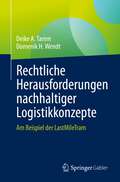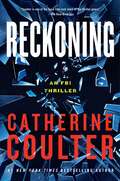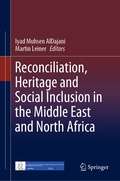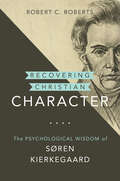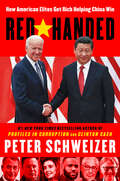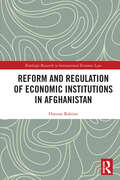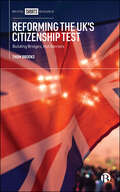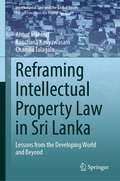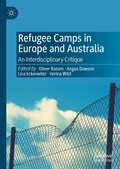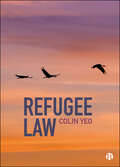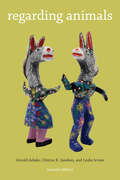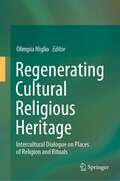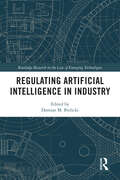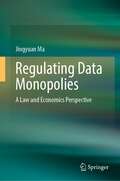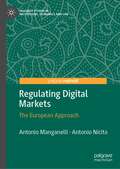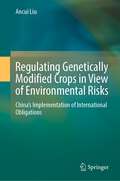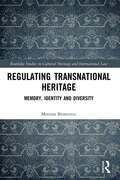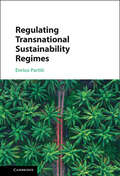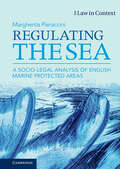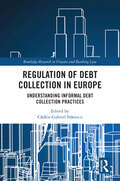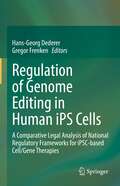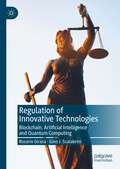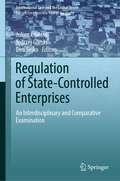- Table View
- List View
Rechtliche Herausforderungen nachhaltiger Logistikkonzepte: Am Beispiel der LastMileTram
by Domenik H. Wendt Deike A. TammDas Buch beleuchtet neue Mobilitätslösungen aus rechtlicher Perspektive. Der Bedarf nach neuen Mobilitätskonzepten im urbanen Raum besteht heute mehr denn je, etwa um die Feinstaubbelastung und den CO2-Ausstoß in Kommunen zu reduzieren und gleichzeitig dem massiven (auch pandemiebedingten) Anstieg des Pakettransports gerecht zu werden. Am Beispiel der LastMileTram wird der Ansatz verfolgt, den Pakettransport auf die Schiene zu verlegen. Hierzu sollen freie Kapazitäten der städtischen Straßenbahnen genutzt und mit der Belieferung durch Lastenräder kombiniert werden. Im Rahmen des Projekts wurden zahlreiche rechtliche Herausforderungen der „Güterstraßenbahn“ identifiziert. Diese werden in diesem Buch vorgestellt. Die rechtliche Analyse umfasst sowohl europarechtliche als auch nationale öffentlich-rechtliche Aspekte. Zudem werden die zivilrechtlichen Haftungsverhältnisse begutachtet. Darüber hinaus werden Anregungen zur Reformierung der Gesetzeslage erörtert.
Rechts motivierte Brand- und Sprengstoffanschläge: Eine empirische Untersuchung zu Tathintergründen, justizieller Bearbeitung und Täter*innen
by Jana BerberichIn dem vorliegenden Buch werden Strafverfahrensakten aus Nordrhein-Westfalen und Sachsen analysiert. Die Akten haben die von den staatlichen Registrierungsbehörden als PMK-rechts eingeordneten Brandstiftungs- und Sprengstoffdelikte der Jahre 2015, 2016 und 2017 zum Gegenstand. Diese Jahre wurden aufgrund der hohen Fallzahlen und des betrachteten Kontexts der Zuwanderungsbewegung gewählt. Im Fokus der Studie stehen die Hintergründe der Taten sowie deren Täter*innen. Im Wege einer Aktenanalyse werden Umstände der Taten (wie Deliktsart, Uhr- und Tageszeit, Tatort) sowie Merkmale zu den Täter*innen (wie Alter, Geschlecht, Herkunft) erhoben. Ebenfalls werden der Verlauf des Strafverfahrens und Merkmale der Opfer untersucht, soweit dies möglich ist. Für einen Überblick werden außerdem umfassend die zur Verfügung stehenden staatlichen und nichtstaatlichen Statistiken zur Entwicklung der rechts motivierten Brand- und Sprengstoffdelikte ausgewertet.
Reckoning: An FBI Thriller (An FBI Thriller #26)
by Catherine CoulterAgents Savich and Sherlock are back in the latest installment in Catherine Coulter’s #1 New York Times bestselling FBI Thriller series, and this time both are enlisted to help women with traumatic pasts who are in mortal danger.When she was twelve years old, Kirra Mandarian’s parents were murdered and she barely escaped with her life. Fourteen years later Kirra is a commonwealth attorney back home in Porte Franklin, Virginia, and her goal is to find out who killed her parents and why. She assumes the identity of E.N.—Eliot Ness—and gathers proof to bring down the man she believes was behind her parents’ deaths. She quickly learns that big-time criminals are very dangerous indeed and realizes she needs Dillon Savich’s help. Savich brings in Special Agent Griffin Hammersmith to work with Lieutenant Jeter Thorpe, the young detective who’d saved Kirra years before.Emma Hunt, a piano prodigy and the granddaughter of powerful crime boss Mason Lord, was only six years old when she was abducted. Then, she was saved by her adoptive father, San Francisco federal judge Ramsey Hunt. Now a 12-year-old with a black belt in Tae Kwon Do, she narrowly saves herself from a would-be kidnapper at Davies Hall in San Francisco. Worried for her safety, Emma’s entire family joins her for her next performance, at the Kennedy Center in Washington, D.C.. Sherlock and officers from METRO are assigned to protect her, but things don’t turn out as planned…
Reconciliation, Heritage and Social Inclusion in the Middle East and North Africa
by Martin Leiner Iyad Muhsen AlDajaniThis book, sponsored by the Academic Alliance for Reconciliation Studies in the Middle East and North Africa (AARMENA), focuses on peacebuilding, conflict transformation, and shifts toward approaching the reconciliation process as an inter-, trans- and multidisciplinary field. The research presented in the series focuses on the Middle East and North Africa, highlighting contributions by practitioners and scholars alike. This volume showcases research on Heritage, Reconciliation, and Social Inclusion in the Middle East and North Africa. It reflects various inter-, trans- and multidisciplinary approaches applied both theoretically and practically, and explores conflict transformation and transitional shifts towards peacebuilding and reconciliation in the MENA (Middle East and North Africa) region. The content is divided into five sections, the first of which examines the importance of reconciliation, peacebuilding, and social inclusion in contributions by experts in the field such as Martin Leiner, Wolfgang Dietrich, Mohammad Abu Nimer, Mohmmad Alshraideh and Iyad Aldajani. The second and third section explore digital humanities and the research sciences respectively, while the fourth turns to practices of heritage and reconciliation. The fifth section presents case studies on practices, conducted by expert researchers for heritage, reconciliation, and social inclusion in higher education.
Recovering Christian Character: The Psychological Wisdom of Søren Kierkegaard (Kierkegaard as a Christian Thinker)
by Robert C. RobertsDiscipleship guidance from the writings of Kierkegaard Genuine Christian character often runs counter to prevailing notions of Christianity—as much in today&’s era of nationalistic religiosity as in the staid Christendom of Søren Kierkegaard&’s time. Kierkegaard responded to the hypocrisy around him by becoming a missionary of sorts in the Western world. Through his writing he exposed the illusions of conventional wisdom while advancing a compelling vision of the true Christian life that would give rise to essential virtues like faith, hope, love, patience, gratitude, and humility. What might Kierkegaard say to us today about recovering a genuine Christian character amid manifold corruptions of the gospel? Robert C. Roberts guides the reader through Kierkegaard&’s thought about character—clarifying while never unduly simplifying—to show how Kierkegaard&’s prescient psychological insights can be applied in the lives of twenty-first-century Christians interested in personal formation. Taking on a Kierkegaardian voice of his own, Roberts powerfully illustrates how virtue arises not from the mastery of individual ethical principles but from the continuity of one&’s soul with the heart of God.
Red-Handed: How American Elites Get Rich Helping China Win
by Peter SchweizerPeter Schweizer says that, in a quarter-century as an investigative journalist, this is the scariest investigation he has ever conducted. That the Chinese government seeks to infiltrate American institutions is hardly surprising. What is wholly new, however, are the number of American elites who are eager to help the Chinese dictatorship in its quest for global hegemony. <p><p> Presidential families, Silicon Valley gurus, Wall Street high rollers, Ivy League universities, even professional athletes—all willing to sacrifice American strength and security on the altar of personal enrichment. In Red-Handed, six-time New York Times bestselling investigator Peter Schweizer presents his most alarming findings to date by revealing the secret deals wealthy Americans have cut to help China build its military, technological, and economic might. Equally as astonishing, many of these elites quietly believe the Chinese dictatorial regime is superior to American democracy. <p><p> Schweizer and his team of forensic investigators spent over a year scouring a massive trove of global corporate records and legal filings to expose the hidden transactions China’s enablers hoped would never see the light of day. And as Schweizer’s past bombshells like Profiles in Corruption, Secret Empires, and Clinton Cash all made clear, there are bad actors on both ends of the political spectrum. Exhaustively researched, crisply told, and chilling, Red-Handed will expose the nexus of power between the Chinese government and the American elites who do its bidding. <p> <b>New York Times Bestseller</b>
Reform and Regulation of Economic Institutions in Afghanistan: Formal and Informal Credit Systems (Routledge Research in International Economic Law)
by Haroun RahimiTaliban's return to power in August of 2021 caused everyone to ask why the two decades of institution building in Afghanistan failed. This book investigates the root causes of failed reforms in an important area of reform: trade and credit institutions. It explains why the efforts to reform and regulate the economic institutions in Afghanistan failed and what we can learn from their failure. It draws on more than eighty interviews with Afghan merchants, business leaders, money dealers, and government officials in five major provinces of Afghanistan to identify the barriers to access to credit and to understand the performance of formal institutions (banks) and their informal counterparts. This book finds that Afghan merchants were often unable to benefit from the offerings of formal institutions for three reasons: a highly volatile business climate, uncertain contract enforcement, and an unsupportive property rights system. Several informal institutions have emerged that alleviate some of the credit constraints on Afghan merchants. These informal institutions include risk-sharing trade credit operations, money dealers’ short-term working capital loans, Gerawee, and Sar qufli. Although these informal institutions have helped Afghan merchants survive, they are unable to support economic growth. This book argues that countries like Afghanistan should solve their institutional dilemma by adopting an approach which the author calls "Grounded Institutional Reform." Using this approach, a country would formalize existing informal institutions, a development that would vastly increase their effectiveness. While this book focuses on credit and trade in Afghanistan, the analysis of "formalizing the informal" can easily be extended to solve other types of economic problems in similarly situated countries. This book should be of great interest to scholars, policymakers, and development workers in the field of law, finance, and development.
Reforming the UK’s Citizenship Test: Building Bridges, Not Barriers
by Thom BrooksHow many questions could you answer in a pub quiz about British values? Designed to ensure new migrants have accepted British values and integrated, the UK's citizenship test is often portrayed as a bad pub quiz with answers few citizens know. With the launch of a new post-Brexit immigration system, this is a critical time to change the test. Thom Brooks draws on first-hand experience of taking the test, and interviews with key figures including past Home Secretaries, to expose the test as ineffective and a barrier to citizenship. This accessible guide offers recommendations for transforming the citizenship test into a ‘bridge to citizenship’ which fosters greater inclusion and integration.
Reframing Intellectual Property Law in Sri Lanka: Lessons from the Developing World and Beyond (International Law and the Global South)
by Althaf Marsoof Kanchana Kariyawasam Chamila TalagalaThis book is a reflection on domestic intellectual property lawmaking from a developing country’s perspective. It focuses on Sri Lanka—a South Asian jurisdiction with a socio-economic, cultural, and political landscape similar to other developing nations in the region, but the intellectual property regime of which has been less explored. The aim of this book is to address the discrepancies, gaps, and flaws in the national intellectual property legal framework of Sri Lanka. In doing so, the book considers Sri Lanka’s obligations under TRIPS and other related intellectual property treaties to which the country is a party. The book also examines approaches adopted by developing countries in the region and beyond, as well as other more developed nations, in calibrating Sri Lanka’s domestic intellectual property regime to better address the country’s domestic needs and national interests. The approach adopted in this book is of relevance, more generally, to policymakers, legislators, legal academics, scholars, jurists, legal practitioners and judges who are keen on exploring the extent to which domestic intellectual property legislation complies with international intellectual property norms and standards and, more importantly, the extent to which domestic law makes use of the flexibilities under international law in addressing domestic needs and national interests.
Refugee Camps in Europe and Australia: An Interdisciplinary Critique
by Angus Dawson Oliver Razum Lisa Eckenwiler Verina WildThis Palgrave Pivot examines refugee camps in the EU, Australia, and their border zones. The approach is interdisciplinary, comprising perspectives of history, ethics, political science, literature, and health. The book argues that current practice of accommodating refugees is arbitrary and disempowering, ranging from strict regulation within nation states to detrimental conditions in extraterritorial camps. It instead proposes to increase public scrutiny of refugee camps, to enforce existing laws, and to endorse ethical place-making. With its contributions from a wide range of fields, this edited volume will be of interest to academics and students in public health, ethics, sociology, politics, and related fields.
Refugee Law
by Colin YeoThe word ‘refugee’ is both evocative and contested; it means different things to different people. For lawyers, the main legal reference point is the UN Refugee Convention of 1951. This concise and engaging book follows the structure of the Convention to explore international refugee law. Including an introduction to the historical and legal context, Colin Yeo draws on his experience as an immigration barrister to explain the present-day legal framework for global refugee protection. Chapters consider: • well-founded fear; • persecution; • the loss of refugee status and exclusion; • the rights of refugees; • and state responses to refugee claims. The book includes studies of key legal cases, reviews the successes and failures of the Convention and looks ahead to the future, including the impact of climate change and the Global Compact on Refugees. Communicating important legal concepts in an approachable way, this is an essential guide for students, lawyers and non-specialists.
Regarding Animals (Animals Culture And Society)
by Arnold Arluke Leslie Irvine Clinton SandersWinner of the Charles Horton Cooley Award, Society for the Study of Symbolic Interaction, 1997 The first edition of Regarding Animals provided insight into the history and practice of how human beings construct animals, and how we construct ourselves and others in relation to them. Considerable progress in how society regards animals has occurred since that time. However, shelters continue to euthanize companion animals, extinction rates climb, and wildlife “management” pits human interests against those of animals. This revised and updated edition of Regarding Animals includes four new chapters, examining how relationships with pets help homeless people to construct positive personal identities; how adolescents who engage in or witness animal abuse understand their acts; how veterinary technicians experience both satisfaction and contamination in their jobs; and how animals are represented in mass media—both traditional editorial media and social media platforms. The authors illustrate how modern society makes it possible for people to shower animals with affection and yet also to abuse or kill them. Although no culture or subculture provides solutions for resolving all moral contradictions, Regarding Animals illuminates how people find ways to live with inconsistent behavior.
Regenerating Cultural Religious Heritage: Intercultural Dialogue on Places of Religion and Rituals
by Olimpia NiglioThis book introduces important reflections on understanding the meaning of cultural-religious heritage in an international context and their relationship with issues of sustainability at the local community level. Through a holistic approach, the book charts new courses in analyzing different cultural policies and methods for preserving and enhancing cultural heritage. Stemming from an intercultural seminar promoted by the International Scientific Committee Places of Religion and Ritual (ICOMOS PRERICO) under the theme of “Reuse and regenerations of cultural-religious heritage in the world: Comparison among cultures,” the book examines the scientific diplomacy and cultural strategies promoted by countries in dialogue with the UN 2030 Agenda, as well as Agenda 21 for Culture. The book seeks to reinforce the value of local cultural policies for supporting and enhancing cultural-religious heritage through specific programs and collaborations in dialogue with government policies. This collection is relevant to scholars working in areas relating to cultural heritage, religious heritage, architectural restoration, protection of the local inheritances, law, and management of the cultural sites.
Regulating Artificial Intelligence in Industry (Routledge Research in the Law of Emerging Technologies)
by Damian M. BielickiArtificial Intelligence (AI) has augmented human activities and unlocked opportunities for many sectors of the economy. It is used for data management and analysis, decision making, and many other aspects. As with most rapidly advancing technologies, law is often playing a catch up role so the study of how law interacts with AI is more critical now than ever before. This book provides a detailed qualitative exploration into regulatory aspects of AI in industry. Offering a unique focus on current practice and existing trends in a wide range of industries where AI plays an increasingly important role, the work contains legal and technical analysis performed by 15 researchers and practitioners from different institutions around the world to provide an overview of how AI is being used and regulated across a wide range of sectors, including aviation, energy, government, healthcare, legal, maritime, military, music, and others. It addresses the broad range of aspects, including privacy, liability, transparency, justice, and others, from the perspective of different jurisdictions. Including a discussion of the role of AI in industry during the Covid-19 pandemic, the chapters also offer a set of recommendations for optimal regulatory interventions. Therefore, this book will be of interest to academics, students and practitioners interested in technological and regulatory aspects of AI.
Regulating Data Monopolies: A Law and Economics Perspective
by Jingyuan MaThis book analyzes the business model of enterprises in the digital economy by taking an economic and comparative perspective. The aim of this book is to conduct an in-depth analysis of the anti-competitive behavior of companies who monopolize data, and put forward the necessity of regulating data monopoly by exploring the causes and characteristics of their anti-competitive behavior. It studies four aspects of the differences between data monopoly and traditional monopolistic behavior, namely defining the relevant market for data monopolies, the entry barrier, the problem of determining the dominant position of data monopoly, and the influence on consumer welfare. It points out the limitations of traditional regulatory tools and discusses how new regulatory methods could be developed within the competition legal framework to restrict data monopolies. It proposes how economic analytical tools used in traditional anti-monopoly law are facing challenges and how competition enforcement agencies could adjust regulatory methods to deal with new anti-competitive behavior by data monopolies.
Regulating Digital Markets: The European Approach (Palgrave Studies in Institutions, Economics and Law)
by Antonio Nicita Antonio ManganelliThis book illustrates the challenges that regulators and policy makers have faced in the transition from the ‘old’ network industries to the new digital ecosystem. It succinctly describes the evolution of digital economy, its main actors, notably global digital platforms, as well as its interactions, interdependences, and trade-offs. Eventually, it proposes insights about why public rules are needed, what kind of rules could be more effective, fair, and efficient, and who should pose and enforce them. The book is opened by an introduction, dealing with Digital Transformation, Big Techs, and Public Policies, which provides a general conceptual and thematic framework to the following analysis but could be also read as a stand-alone paper. The following chapters are grouped in two parts: I. The Evolution of Digital Markets and Digital Rights, and II. Regulating Big Tech’s Impact on Market and Society. The secondary title - the European approach – has a twofold meaning. It highlights the fact that this work has a clear focus on EU law and policy - although the economic and institutional issues addressed are global phenomena, common to all world’s economies. In addition, it also underlines that European digital policy is not yet complete and effective. This book intends to provide a small contribution to the ongoing policy making process, as well as to the wider academic and policy debate.
Regulating Genetically Modified Crops in View of Environmental Risks: China’s Implementation of International Obligations
by Ancui LiuThis book analyzes international and Chinese regulatory approaches addressing environmental risks that may be caused by GM crops and examines how China implements its international obligations in its policies and laws. Using the legal doctrinal method, the book discusses the precautionary principle and the public involvement principle, as well as several legal measures at the international law level and in Chinese law. It observes that legal principles and measures as provided for in China’s GMO legal framework have generally implemented the international obligations regarding the prevention of environmental risks that may be caused by the cultivation of GM crops and related activities. However, the book argues that Chinese law lacks an explicit codification of the precautionary principle, and the same is true with regard to public participation; the regulatory framework lacks specific obligations. It concludes that future research should focus on the application and enforcement of the relevant Chinese legislation, and that it is also important to investigate how the environmental risks that may be caused by new techniques, such as genome-editing techniques, could be prevented, given the experience gained by regulating the cultivation of GM crops and related activities.
Regulating Transnational Heritage: Memory, Identity and Diversity (Routledge Studies in Cultural Heritage and International Law)
by Merima BruncevicThere is a vast body of international and national law that regulates cultural heritage. However, the current regulation remains quite blind to the so called "transnational heritage". This is heritage where there is no community recognized in law that it can be directly attributed to and that can be responsible for its safekeeping and preservation. It can also be items of heritage where the claim of ownership is disputed between two or more peoples or communities. Transnational heritage challenges the idea of monolithic, mono-cultural, ethno-national states. There are a number of examples of such cultural heritage, for instance the Buddhist Bamiyan statutes in Afghanistan, Palmyra in Syria, the Jewish heritage of Iraq, or various items that are currently housed in large, often Western, museums, as a result of colonial practices. This book explores the regulation of transnational heritage. By discussing many cases of transnational heritage and the problems that arise due to the lack of regulation the book analyses the manifestations of memories and constructions of communities through heritage. It focuses particularly on the concept of community. How are communities constructed in cultural heritage law and what falls outside of the definitions of community? The book underlines that the issues surrounding transnational heritage involve more than a communal right to culture. It is argued that transnational heritage also directly affects wider matters of law such as citizenship, human rights, sovereignty, as well as the movement of people and cultural goods.
Regulating Transnational Sustainability Regimes
by Enrico PartitiThe book studies emergence and consolidation of voluntary sustainability standards (VSS); private standards defining sustainability-related product features. The book takes stock of their success and their potential in mediating between economic and non-economic concerns of global production. Despite their private and voluntary nature, VSS generate profound consequences for the producers seeking certification, for the consumers purchasing certified products, and for others affected by their standards. VSS are used by public authorities in the EU as a functional complement to public measures regulating global value chains. At this juncture of market proliferation and public use of private regimes, this book studies how public authority can control, coordinate and review VSS. It studies how the regulation of VSS could unfold through substantive and procedural legal requirements in the domain of European Union law and World Trade Organisation law, as well as through the incentives offered by VSS employment in public measures.
Regulating the End of Life: Death Rights
by Sue WestwoodDeath Rights is a collection of cutting-edge chapters on assisted dying and euthanasia, written by leading authors in the field. Providing an overview of current regulation on assisted dying and euthanasia, both in the UK and internationally, this book also addresses the associated debates on ethical, moral and rights issues. It considers whether, just as there is a right to life, there should also be a right to death, especially in the context of unbearable human suffering. The unintended consequences of prohibitions on assisted dying and euthanasia are explored, and the argument put forward that knowing one can choose when and how one dies can be life-extending, rather than life-limiting. Key critiques from feminist and disability studies are addressed. The overarching theme of the collection is that death is an embodied right which we should be entitled to exercise, with appropriate safeguards, as and when we choose. Making a novel contribution to the debate on assisted dying, this interdisciplinary book will appeal to those with relevant interests in law, socio-legal studies, applied ethics, medical ethics, politics, philosophy, and sociology.
Regulating the Sea: A Socio-Legal Analysis of English Marine Protected Areas (Law in Context)
by Margherita PieracciniThis book is the first ever written on English marine conservation regulation from a socio-legal perspective. The monograph presents an in-depth analysis of key aspects of Marine Protected Areas regulation in England, offering the reader access to an under-investigated field. Such regulatory mapping is complemented by an interdisciplinary treatment of the subject exploring the relationship between people and marine parks through central themes in environmental social sciences and regulatory theory, namely space, rationalisation, democracy and adaptation. Thus, the book is of interest to environmental lawyers and regulatory scholars but also to human geographers, environmental sociologists and political scientists. As the book provides critical reflections on current legal and regulatory structures, it contains valuable insights for policymakers and regulators. The book has a strong methodological basis drawing on in-depth desk-based research, complemented by primary qualitative research, conducted over a number of years.
Regulation of Debt Collection in Europe: Understanding Informal Debt Collection Practices (Routledge Research in Finance and Banking Law)
by Cătălin-Gabriel StănescuDue to the absence of due process and other procedural guarantees generally offered by judicial enforcement, informal debt collection practices (IDCPs) can become abusive, harming both consumers and the economy by threatening consumers’ physical, psychological, and economic wellbeing; exposing law-abiding debt collectors to unfair competition; undermining the financial system, and negatively impacting social peace by resorting to criminal activity. The need to control and harmonize IDCPs surfaced in connection with the European Commission’s Action Plan to tackle the high level of non-performing loans caused by the financial crisis and the Covid-19 pandemic - specifically the Proposal for a Directive on Credit Servicers, Credit Purchasers, and the Recovery of Collateral (CSD). Harmonizing the regulation of abusive IDCPs is vital for several reasons. First, IDCPs have a cross-border dimension due to the freedom of movement, enabling debt collection operations across the internal market. Second, the internal market’s size amounts to over 450 million citizens potentially exposed to abusive IDCPs. The regulatory frameworks addressing IDCPs in the EU display divergent characteristics that may be difficult to navigate and require creating a level-playing field for consumers and debt collectors, especially when approaches vary at Member State level. This book addresses this gap by providing a comprehensive guide to regulating informal debt collection practices in eight Member States (MS) of the EU and the United Kingdom (UK). It serves as a comparative law instrument for implementing the recently adopted Credit Servicers Directive (CSD). It will be important reading for students, academics and stakeholders with an interest in debt collection practices and the law.
Regulation of Genome Editing in Human iPS Cells: A Comparative Legal Analysis of National Regulatory Frameworks for iPSC-based Cell/Gene Therapies
by Hans-Georg Dederer Gregor FrenkenThe book provides a concise overview of currently applicable regulatory frameworks of states which are among the world leaders in research and development (R&D) of cell and gene therapies. Developments in genome editing are expected to lead to new possibilities for the treatment of hereditary diseases in humans. The treatment of such often severe but hitherto uncurable diseases can be based on genome-edited induced pluripotent stem cells (iPS cells). Such treatments constitute combined cell/gene therapies. These therapies need to be governed by a regulatory framework which ensures quality, safety, and efficacy of the relevant therapeutic products. On the other hand, such regulations may retard product approval and impede R&D. Accordingly, national regulations for therapies based on genome-edited iPS cells are an important and, as the case may be, decisive factor for both researchers and industry regarding their decision where to locate their R&D activities. Therefore, regulatory frameworks impact significantly on the competitiveness of states and their economies. This is why a comparative analysis of laws and regulations of different countries matters. Such a comparative legal analysis provides an important insight into regulatory concepts which, in turn, may inspire adjustments of, or amendments to, domestic legal regimes. For this purpose, experts present country reports on France, Germany, Japan, South Korea, Switzerland, and the USA. The reports on France and Germany also refer to the parameters and implications arising from pertinent EU law. This contributed volume is aimed at researchers, but also at, e.g., legal scholars, lawmakers, regulators, and political decision makers.
Regulation of Innovative Technologies: Blockchain, Artificial Intelligence and Quantum Computing
by Rosario Girasa Gino J. ScalabriniThis book explores the regulation of emerging technologies. Developments such as bitcoin (based on blockchain technology), artificial intelligence, quantum computing, and other technical advances have the potential to revolutionize many aspects of everyday life. As with other significant occurrences, especially when coupled by financial rewards, there are the inevitable attempts to reap gains unlawfully. This book examines the legal and regulatory enactments that attempt to undermine the risks to society as well as the dangers to individual freedoms that the technologies present when abused by governmental and non-governmental authorities. Included are discussions of the dangers to the right of privacy posed by facial recognition, physical location tracking, automated license plate recognition (ALPR) and other evolving applications of technology. This book is an invaluable resource for those interested in the regulation of emerging technologies particularly as they relate to blockchain, artificial intelligence, and the most current advances in quantum computing. Emphasis is focused on invasion of privacy, particularly by government authorities, antitrust implications of private companies and the efforts of international entities to counter alleged abuses by them.
Regulation of State-Controlled Enterprises: An Interdisciplinary and Comparative Examination (International Law and the Global South)
by Julien Chaisse Jędrzej Górski Dini SejkoThis book analyses actual and potential normative (whether legislative or contractual) conflicts and complex transnational disputes related to state-controlled enterprises (SCEs) operations and how they are interwoven with the problem of foreign direct investment. Moreover, SCEs also fall within the remit of international political economy, international economics and other SCE-related fields that go beyond purely legal or regulatory matters. In this connection, research on such economic and political determinants of SCE’s operations greatly informs and supplements the state of knowledge on how to best regulate cross-border aspects of SCE’s and is also be covered in this book. The book also aims to analyse the “SCE phenomenon” which includes a wide panoply of entities that have various structures with different degrees of control by states at the central or regional level, and that critically discuss the above-mentioned overlapping legal economic and political systems which can emerge under various shades of shadows casted by governmental umbrellas (i.e., the control can be exercised through ownership, right to appoint the management, and special-voting-rights). The chapters in this book are grouped, so as to address cross-border investment by and in SCE, into four coherent major parts, namely --- (i) the regulatory framework of state capitalism: laws, treaties, and contracts; (ii) economic and institutional expansion of state capitalism; (iii) the accountability of state capitalism: exploring the forms of liabilities; and (iv) regional and country perspectives. Contributions address the core theme from a broad range of SCE and international economic regulations, including but not limited to competition law, WTO law, investment law, and financial/monetary law. They also cover the new emerging generation of Free Trade Agreements (EU-Vietnam FTA, EU China investment treaty, Regional Comprehensive Economic Partnership; and the coordination between treaty systems). The book is a valuable addition and companion for courses, such as international trade law, international law of foreign investment, transnational law, international and economic development, world politics, law of preferential trade agreements, international economics, and economics of development.
